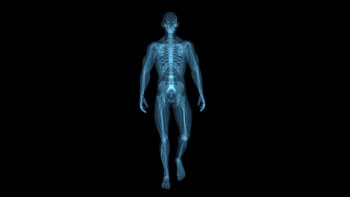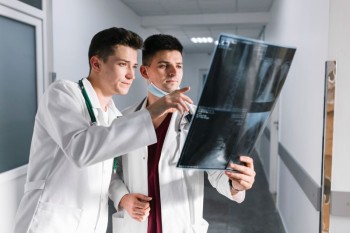
The EC Renogram is a non-invasive imaging procedure designed to assess renal function and blood flow.
EC Renogram or Renal Scan in India with Cost
EC Renogram or Renal
Scan in Detail: Navigating Renal Function with Radiological Precision
In the realm of renal diagnostics, the EC Renogram, also known as the Renal Scan, stands as a valuable imaging technique, providing crucial insights into the structure and function of the kidneys. This comprehensive guide aims to elucidate the significance, procedure, and applications of the EC Renogram, offering a detailed understanding of its role in modern healthcare.
Introduction
The EC Renogram is a non-invasive imaging procedure designed to assess renal function and blood flow. Utilizing radiopharmaceuticals, this diagnostic tool enables healthcare professionals to evaluate the kidneys' performance, identify abnormalities, and gain comprehensive insights into renal health.
Understanding the EC
Renogram
Radiopharmaceutical Administration:
The EC Renogram involves the injection of a radiopharmaceutical, often technetium-99m mercaptoacetyltriglycine (MAG3), into the bloodstream. This radiotracer is specifically taken up by the kidneys, allowing for detailed imaging of renal function.
Importance in Renal
Imaging
The EC Renogram holds paramount importance in various aspects of renal health:
Renal Blood Flow Assessment: Essential for
evaluating blood flow to the kidneys.
Functional Evaluation: Provides
insights into the kidneys' ability to filter and excrete substances.
Detection of Abnormalities: Aids in
identifying abnormalities such as obstruction, kidney disease, or congenital
issues.
Preparation for EC
Renogram
Preparation for an EC Renogram typically involves:
Hydration: Adequate hydration before the scan
is encouraged for optimal imaging results.
Medication Adjustments: Temporary pause
or modification of specific medications that could impact the scan process.
Procedure: Evaluating
Renal Function
Radiotracer Injection: The patient receives the
radiopharmaceutical intravenously, where it circulates and is filtered by the
kidneys.
Imaging Process: A gamma camera captures images,
providing real-time information about renal blood flow and function. Dynamic
imaging allows for continuous monitoring.
Assessment Areas in EC
Renogram
The EC Renogram is employed to assess various aspects of renal health, including:
Renal Blood Flow: Evaluating blood flow to the
kidneys.
Functional Evaluation: Gauging the
kidneys' ability to filter and excrete substances.
Obstruction Detection: Identifying
potential obstructions or abnormalities in the urinary tract.
Benefits of EC Renogram
Real-time Monitoring: Provides real-time, dynamic
imaging, allowing for continuous monitoring of renal function.
Functional Insights: Offers detailed
insights into the functional aspects of the kidneys.
Early Detection: Enables the early detection of
renal abnormalities, facilitating timely interventions.
Risks and Considerations
The EC Renogram involves exposure to low levels of radiation. However, the benefits of accurate renal assessment generally outweigh the associated risks.
Clinical Applications
EC Renograms find applications in various clinical scenarios, including:
Renal Function Assessment: Crucial for
evaluating renal function and detecting abnormalities. Obstruction Detection: Aids in identifying potential obstructions or abnormalities in the urinary tract.
Expert Perspectives
Nuclear medicine specialists and nephrologists collaborate to interpret EC Renogram results, providing expert insights into renal health.
Technological Advancements
Continual advancements in imaging technology contribute to the refinement of EC Renograms, enhancing image resolution and diagnostic capabilities.
Patient Experience
While EC Renograms involve exposure to radiation, they are generally well-tolerated by patients. The procedure provides valuable information to healthcare providers without invasive measures.
Conclusion
In conclusion, the EC Renogram stands as a pivotal tool in the realm of renal imaging, offering a comprehensive understanding of both structural and functional aspects of the kidneys. Its applications in evaluating renal blood flow, detecting abnormalities, and guiding treatment decisions contribute to advanced and personalized healthcare for individuals with renal concerns.
FAQs (Frequently Asked Questions) related to the EC Renogram or Renal
Scan
1. What is the typical duration of an EC Renogram procedure?
The EC Renogram procedure usually takes about 30 to 45 minutes. However, the duration may vary based on individual factors and specific imaging protocols.
2. Are there any specific risks associated with the radiopharmaceutical used in an EC Renogram?
The radiopharmaceuticals used, such as technetium-99m MAG3, are generally considered safe and have a low risk of adverse reactions. The benefits of obtaining accurate renal information usually outweigh the minimal associated risks.
3. Can pregnant or breastfeeding individuals undergo an EC Renogram?
Special precautions are taken for pregnant or breastfeeding individuals, as exposure to radiation may pose risks to the developing fetus or nursing infant. Healthcare providers will carefully assess the necessity and potential risks before recommending the procedure.
4. How often should someone undergo an EC Renogram?
The frequency of EC Renogram scans depends on individual health conditions and the recommendations of healthcare providers. It is typically performed as needed for diagnostic purposes or to monitor specific renal conditions.
5. Is there any special preparation required for pediatric patients undergoing an EC Renogram?
Pediatric patients may have specific preparation instructions, and the healthcare team will tailor the procedure to suit the child's age and condition. Parents or guardians will be provided with guidance on any necessary preparations.
6. Can patients with claustrophobia undergo an EC Renogram?
Yes, EC Renogram procedures are non-invasive and do not involve confined spaces like some other imaging techniques. Individuals with claustrophobia typically find this procedure more comfortable.
7. How soon can patients resume their normal activities after an EC Renogram?
Patients can usually resume normal activities immediately after the EC Renogram. The radiopharmaceutical used in the procedure has a short half-life, and any residual radiation is minimal.
8. Are there alternative imaging methods to an EC Renogram for assessing renal function?
Yes, other imaging methods like CT scans and MRIs can provide information about the kidneys. However, the choice of imaging method depends on the specific diagnostic requirements and the preferences of the healthcare provider.
9. What conditions or symptoms might prompt a healthcare provider to recommend an EC Renogram?
EC Renograms are often recommended for assessing renal blood flow, detecting abnormalities, evaluating kidney function, and identifying potential obstructions. Healthcare providers may suggest this procedure for conditions such as kidney disease, urinary tract issues, or unexplained pain.
10. Can individuals with kidney conditions or impaired renal function undergo an EC Renogram?
In many cases, individuals with kidney conditions can undergo an EC Renogram. However, the healthcare team will carefully assess the individual's health status and make necessary adjustments to ensure a safe and effective procedure.
These FAQs aim to provide additional information and address common queries related to the EC Renogram or Renal Scan. Always consult with healthcare professionals for personalized advice and guidance based on individual health circumstances
(0)
Login to continue



